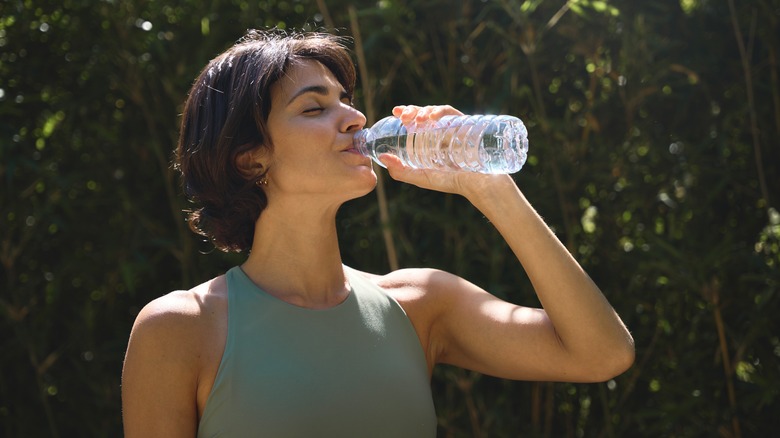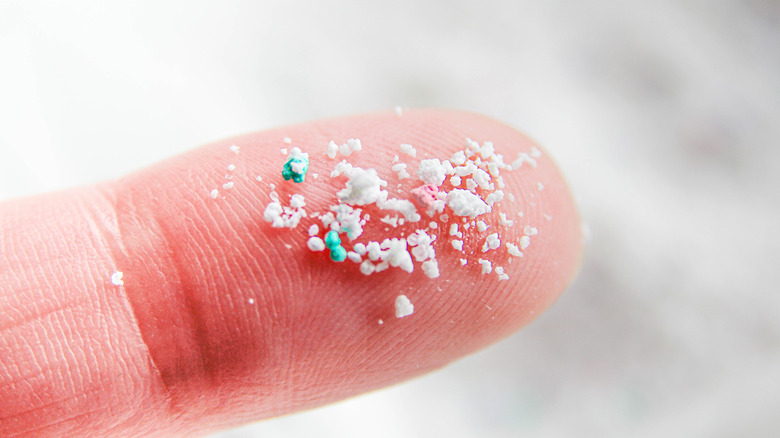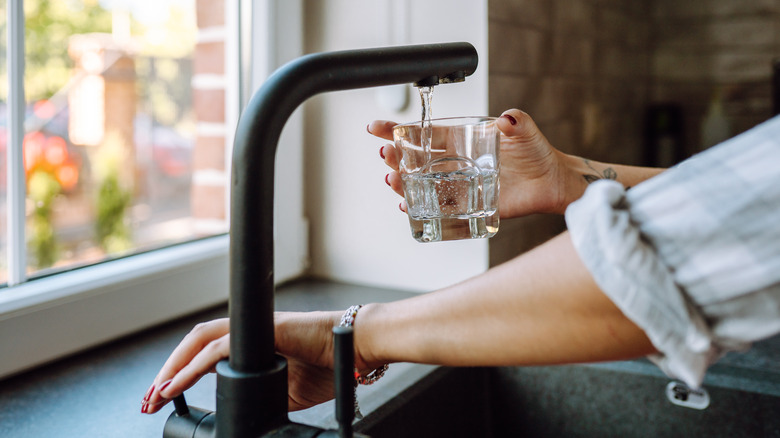Drinking From Plastic Water Bottles Could Have An Unexpected Effect On Your Blood Pressure
We may receive a commission on purchases made from links.
When you get thirsty, you can head to a vending machine or convenience store for several hydrating options. You've heard how sugar-sweetened sodas can wreck your health, and sports drinks aren't much better for you. So you reach for that bottle of water, knowing that water is best for keeping yourself hydrated.
That plastic water bottle has harmful substances such as phthalates and bisphenol A (BPA) that can seep into your water. Once those substances reach your system, they can affect various aspects of your cardiovascular and metabolic health. A 2018 study in Environmental Science and Pollution measured levels of phthalates in people's systems and found that moderate exposure to certain phthalates was linked to higher blood pressure and cholesterol. The concentration of BPA in your system is also linked to your cardiovascular health, according to a 2012 article in Hypertension. Higher BPA levels in your system can double your risk of high blood pressure.
Another concern with drinking from plastic water bottles is the microplastics. Microplastics not only increase your risk of high blood pressure but also raise your risk of chronic diseases and inflammation.
How microplastics in bottled water can affect your health
If you think bottled water is healthier than tap water, think again. Although tap water in the United States is healthier than tap water in lower-income countries, two-thirds of the bottled water you see on the shelves is tap water, according to a 2024 commentary in BMJ Global Health. Microplastics, phthalates, and BPA can be found in as many as 78% of bottled water.
"Microplastics can cause systemic inflammation leading to cardiovascular disease, insulin resistance, and IBS among others," Registered Dietitian at Top Nutrition Coaching Lacy Puttuck tells Health Digest. "They can be irritating to tissues which over time, can lead to chronic inflammation and disease."
Puttuck said that these plastics can also disrupt your endocrine system, which regulates hormones such as testosterone, estrogen, and thyroid. If your endocrine system is out of balance, it could affect your fertility or mental health. Microplastics can also weaken your immune system, leading to more colds and other infections.
"Ingestion of microplastics also promotes oxidative stress and the production of free radicals," Puttuck said. "Elevated oxidative stress is linked to cancer development, neurological disease, and cardiovascular disease." A 2024 article in the New England Journal of Medicine found microplastics in the artery plaques in many people with carotid artery disease. These jagged plastic particles found in the artery plaques can increase your risk of heart attack, stroke, or death.
How to stay hydrated without bottled water
Most people need between 80 and 100 ounces of fluid a day to stay hydrated, says Puttuck. Some people might need more than that if they exercise or carry a few more pounds, and your water needs also increase if you're exposed to extremely hot temperatures. "Minimizing exposure to microplastics can be challenging because we are exposed from several sources," Puttuck said. "Since bottled water is one of the main contributors to our exposure, it is important to get water and hydration in other ways."
Puttuck suggests investing in a reusable glass or stainless steel water bottle. Rather than filling it with bottled water, fill it with water filtered through a carbon or reverse osmosis filter system. Some reverse osmosis water filter systems can be installed under your kitchen sink; you can also find countertop reverse osmosis water filters on Amazon. "This method takes some practice but greatly reduces your exposure to microplastics and can improve your health," Puttuck said.


